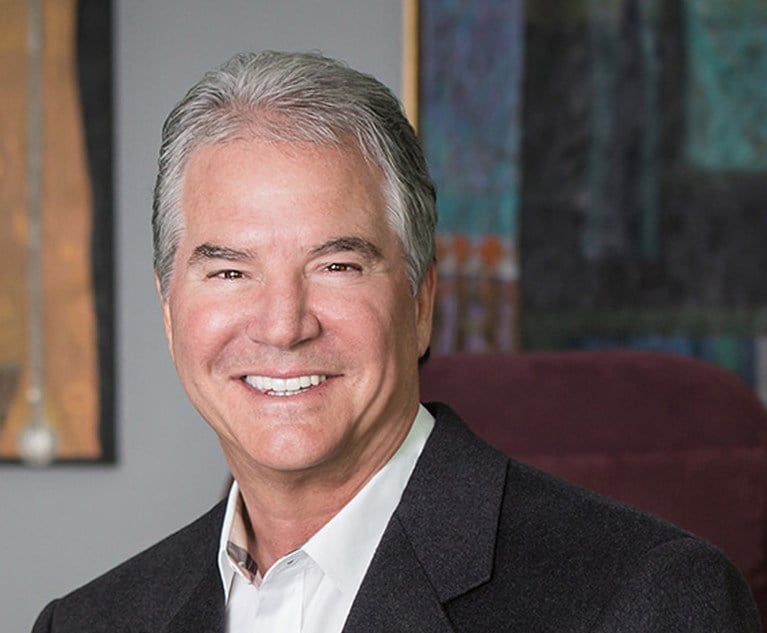LA-Area Law School to Remain Open, but Parts Ways With the ABA
Trustees at the University of La Verne have voted to drop ABA accreditation for its law school and instead become accredited by the State Bar of California.
November 21, 2019 at 01:02 PM
5 minute read
 Los Angeles. (Photo: iStock)
Los Angeles. (Photo: iStock)
The University of La Verne will keep its law school open, but as a California-accredited campus instead of one blessed by the American Bar Association.
The university's board of trustees Monday voted to convert the law school from ABA accreditation to accreditation by the State Bar of California—a move that will make it easier for the Ontario, California, campus to meet program standards. But it will also mean that graduates are only eligible to take the bar exam in California, at least initially. About 240 students are enrolled at the school.
Under the new plan, La Verne would become the first law school to drop its ABA accreditation in the wake of that body adopting tougher bar exam standards. The ABA in 2018 changed that standard, giving law schools two years instead of five years to ensure that at least 75% of their graduates pass the licensing exam.
That heightened standard was one factor that prompted the board of trustees last month to order a full-scale review of the La Verne's law school and its sustainability. The school's long-term finances were another catalyst for the review, officials said.
"The California bar standards are lower for bar pass rates than what the ABA is, but I think the board still has high expectations for how the school will perform and student success," said university spokesman Rod Leveque in an interview Thursday. "There probably was a path forward for the college of law in which it could have put a lot of dollars into the ABA program and get it to the point where it could meet the new ABA standard, but at what cost? What would we have to sacrifice in terms of mission and in terms of financial obligations?"
Should La Verne successfully convert to California accreditation, it would become the seventh school to disappear from the ranks of ABA-accredited campuses since 2015. (That figure includes the 2015 merger of William Mitchell College of Law and Hamline University School of Law.) And it would be the second law school in Southern California to leave the ABA roles. Whittier Law School, about 40 miles to the south in Costa Mesa, is in its final year of operation. University officials in 2017 decided to shut the school down amid falling enrollment and financial shortfalls.
La Verne's board of trustees in October voted to form two committees to investigate the law school's prospects—one composed of faculty and the other of administrators—to issue recommendations. Neither committee recommended closing the law school, but committee members offered a wide array of views on what should happen with the law school, Leveque said.
Not counting the soon-to-close Whittier, California is home to 20 ABA-accredited law schools. (Thomas Jefferson School of Law in San Diego had its ABA-accreditation revoked in June, but it remains accredited while it appeals that decision.) Meanwhile, 21 other law schools are accredited by the State Bar of California.
Graduates of California-accredited law schools tend not to perform as well on the state's bar exam. Graduates of ABA-accredited law schools had a 71% first-time pass rate on the July 2019 exam. That figure was 26% for graduates of California-accredited schools. Graduates of California-accredited law schools are eligible to sit for the bar in 19 other jurisdictions, but in most cases they must first pass the California exam then practice for a certain number of years before taking the exam elsewhere.
The bar exam has long been a sticking point for La Verne's law school, which opened in 1970 but did not seek ABA accreditation until 1996. It took 17 years for the school to gain full ABA accreditation, largely due to its poor bar exam results. Just 32% of its graduates who took the licensing exam in 2018 passed. The school first gained provisional accreditation in 2006, but that status lapsed in 2011 after the ABA declined to extend full accreditation, citing low bar-passage rates. The ABA reinstated the school's provisional status the following year in time for graduates to be eligible to sit for the bar exam, and the school gained full accreditation in 2016.
La Verne president Devorah Lieberman said in an announcement of the decision that seeking California accreditation "returns the college to its roots."
The board of trustees has requested a transition plan by Dec. 16. All current La Verne law students will graduate with a degree from an ABA-accredited law school. But plans call for a phase in under which new students would start the California-accredited program, perhaps as early as next fall, Leveque said.
Reaction to the decision to seek accreditation from the State Bar of California has run the gamut, according to Leveque.
"Obviously, people are concerned," he said. "Anytime there is change there can be anxiety. But we have tried to engage the faculty and students in the process and make sure they know what's going on."
This content has been archived. It is available through our partners, LexisNexis® and Bloomberg Law.
To view this content, please continue to their sites.
Not a Lexis Subscriber?
Subscribe Now
Not a Bloomberg Law Subscriber?
Subscribe Now
NOT FOR REPRINT
© 2025 ALM Global, LLC, All Rights Reserved. Request academic re-use from www.copyright.com. All other uses, submit a request to [email protected]. For more information visit Asset & Logo Licensing.
You Might Like
View All
Assessing the Second Trump Presidency’s Impact on College Sports


LSAT Administrator Sues to Block AI Tutor From Using ‘Famous, Distinctive’ Test Prep Materials
3 minute readTrending Stories
Who Got The Work
J. Brugh Lower of Gibbons has entered an appearance for industrial equipment supplier Devco Corporation in a pending trademark infringement lawsuit. The suit, accusing the defendant of selling knock-off Graco products, was filed Dec. 18 in New Jersey District Court by Rivkin Radler on behalf of Graco Inc. and Graco Minnesota. The case, assigned to U.S. District Judge Zahid N. Quraishi, is 3:24-cv-11294, Graco Inc. et al v. Devco Corporation.
Who Got The Work
Rebecca Maller-Stein and Kent A. Yalowitz of Arnold & Porter Kaye Scholer have entered their appearances for Hanaco Venture Capital and its executives, Lior Prosor and David Frankel, in a pending securities lawsuit. The action, filed on Dec. 24 in New York Southern District Court by Zell, Aron & Co. on behalf of Goldeneye Advisors, accuses the defendants of negligently and fraudulently managing the plaintiff's $1 million investment. The case, assigned to U.S. District Judge Vernon S. Broderick, is 1:24-cv-09918, Goldeneye Advisors, LLC v. Hanaco Venture Capital, Ltd. et al.
Who Got The Work
Attorneys from A&O Shearman has stepped in as defense counsel for Toronto-Dominion Bank and other defendants in a pending securities class action. The suit, filed Dec. 11 in New York Southern District Court by Bleichmar Fonti & Auld, accuses the defendants of concealing the bank's 'pervasive' deficiencies in regards to its compliance with the Bank Secrecy Act and the quality of its anti-money laundering controls. The case, assigned to U.S. District Judge Arun Subramanian, is 1:24-cv-09445, Gonzalez v. The Toronto-Dominion Bank et al.
Who Got The Work
Crown Castle International, a Pennsylvania company providing shared communications infrastructure, has turned to Luke D. Wolf of Gordon Rees Scully Mansukhani to fend off a pending breach-of-contract lawsuit. The court action, filed Nov. 25 in Michigan Eastern District Court by Hooper Hathaway PC on behalf of The Town Residences LLC, accuses Crown Castle of failing to transfer approximately $30,000 in utility payments from T-Mobile in breach of a roof-top lease and assignment agreement. The case, assigned to U.S. District Judge Susan K. Declercq, is 2:24-cv-13131, The Town Residences LLC v. T-Mobile US, Inc. et al.
Who Got The Work
Wilfred P. Coronato and Daniel M. Schwartz of McCarter & English have stepped in as defense counsel to Electrolux Home Products Inc. in a pending product liability lawsuit. The court action, filed Nov. 26 in New York Eastern District Court by Poulos Lopiccolo PC and Nagel Rice LLP on behalf of David Stern, alleges that the defendant's refrigerators’ drawers and shelving repeatedly break and fall apart within months after purchase. The case, assigned to U.S. District Judge Joan M. Azrack, is 2:24-cv-08204, Stern v. Electrolux Home Products, Inc.
Featured Firms
Law Offices of Gary Martin Hays & Associates, P.C.
(470) 294-1674
Law Offices of Mark E. Salomone
(857) 444-6468
Smith & Hassler
(713) 739-1250







